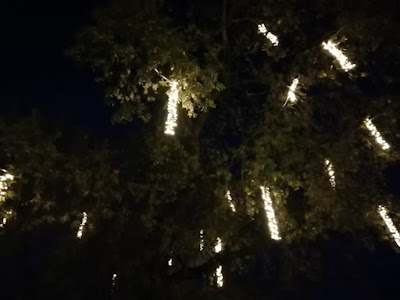The reenchanted world
The philosopher Charles Taylor writes in his book A secular age (2007) about the disenchantment (from Webers entzauberung) of the modern western world. To Taylor the disenchanted world is a place where the only locus of thoughts, feelings, spirituality in the cosmos, is in the human mind, while the enchanted world of our ancestors was a place of spirits and demons. The enchanted world was one in which these forces could cross the porous boundary of our selves and shape our lives, psychic and physical.
In the disenchanted world the boundaries around us are experienced and understood as firmer. The sharpe boundaries between inner and outer implies that thought, meaning, purpose, are only in our minds, not out there in the world. Taylor calls this the buffered self. He writes: "The buffered self can see itself as invulnerable, as master of the meanings of things for it." The buffered self can be autonomous and even disengaged from whatever is outside the boundary, while the porous self of the enchanted world is vulnerable, and the boundary between the personal agent and impersonal forces are blurred. The porous self may be seen as more dependent on the collective and communal, and less in control of the order of its life.
Taylor sees the transition from an enchanted to a disenchanted world as a story of remaking, "the process of disenchantment involves a change in sensibility; one is open to different things." The way we perceive and experience the world has changed. And Taylor is challenging the traditional view that what has happened is that we have gotten rid of irrational beliefs and detrimental stuff. He says that the change in sensibility and the becoming of the buffered self may be seen as an impoverishment, and shows how the standpoint of immanence and the buffered self may imply a loss of meaning, and a related loss of a concept of transformation which goes beyond ordinary human flourishing.
In this perspective the transition from an enchanted to a disenchanted world may be seen as a loss of ability to notice and experience the fullness and richness of life. Many thinkers and popular movements have tried to reconnect with the sensibility which have gone lost, and create a reenchantment of the world. Taylor emphasizes the culture of authenticity, which emerged from the Romantic expressivism of the late 18th century. The focus here is that each of us has his/her own way of realizing humanity, and that its important to find and live out ones own unique expression. This will often be a critique of surrendering to conformity, tradition and conventional authority.
A current from the Romantic which may be seen as an attempt of reenchantment and which are very much alive today, is the longing for the Wilderness and a feeling of "the voice of nature being stifled in us, and that the rediscovery of what I am within is made possible by the resonance I feel with the great current of nature inside me." Thoreau wrote: "Shall I not have intelligence with the earth? Am I not partly leaves and vegetable mould myself?" Taylor describes how this experience of connection with the wholeness of the world has roots in Neoplatonism, but it is now more emphasis on the animality of humans and our kinship with all of nature, even the more wild parts. And a sense that connection with the wild, deeper transrational parts of ourselves is required for our existence. Our genesis in the prehuman and wild is hence given a new moral meaning.
To me these perspectives from Taylor shed light on the ideas which constitute the context of my own journey. Coming from the view of the buffered self where we are diciplined to believe that the rational point of view is that immanent matter is all there is, that consciousness is limited to the brain, and that cosmos is empty of meaning. And then slowly opening up the buffered self, including a fullness and richness of experiencing the world as the porous self, feeling a sense of embedness in nature and cosmos, and that there is something larger than ourselves which is a source of nourishment and community. To me it remains unspecified whether this is immanent or transcendent, whats important to me is to be guided in life by what feels like intuition or higher wisdom, which may lead us towards more connection and love.
Buffered and pourous selves (georgetown.edu)
Taylor, C. (2007): A secular age




Comments
Post a Comment